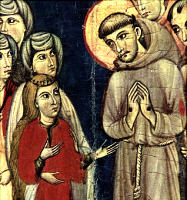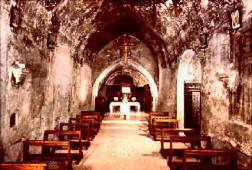Morning Prayer (Lauds)
If this is the first Hour that you are reciting today, you should precede it with the Invitatory Psalm.
O God, come to my aid.
O Lord, make haste to help me.
Glory be to the Father and to the Son and to the Holy Spirit,
as it was in the beginning, is now, and ever shall be,
world without end.
Amen. Alleluia.
Hence, night and clouds that night-time brings,
Confused and dark and troubled things;
The dawn is here, the sky grown white,
Christ is at hand; depart from sight.
Earth’s dusky veil is torn away,
Pierced by the sparkling beams of day:
The world resumes its hues apace
Soon as the day-star shows its face.
But thee, O Christ, alone we seek,
With conscience pure and temper meek:
With tears and chants we humbly pray
That thou wouldst guide us through the day.
So many shades obscure each sense
Which needs thy beams to purge it thence:
Light of the Morning-Star, illume,
Serenely shining, all our gloom.
All laud to God the Father be;
All praise, eternal Son, to thee;
All glory, as is ever meet,
To God the Holy Paraclete.
Psalm 85 (86)
A poor man's prayer in time of trouble |
Make your servant’s heart glad, for to you, O Lord, I have raised it.
Turn your ear to me, Lord, and hear me,
for I am poor and destitute.
Keep my life safe, for I am faithful;
O God, save your servant, who trusts in you.
Take pity upon me, O Lord,
for I call to you all the day long.
Make your servant’s heart glad,
for to you, O Lord, I have raised it.
For you, Lord, are gentle and mild:
you are kind to all those who call on you.
Let your ears hear my prayer, O Lord!
Turn to the voice of my pleading!
In my time of trouble I call on you,
for you, O Lord, will hear me.
No other god is like you, O Lord,
and nothing compares with your works.
All people – all nations you made –
will come and worship before you;
they will give glory to your name.
For you are great, you work wonders:
you alone are God.
O Lord, teach me your paths,
and I will come to your truth.
Make my heart simple and guileless,
so that it honours your name.
I will proclaim you, Lord my God,
and give you praise with all my heart.
I will give glory to your name for ever,
for your great kindness is upon me:
you have rescued me from the deepest depths.
O God, the proud rise against me,
in the meetings of the powerful they seek my life:
they do not keep you in their sight.
And you, Lord, are a God of compassion,
full of mercies, patient and true.
Look upon me, have mercy upon me,
give your strength and protection to your servant:
your servant, the child of your handmaid.
Give me a sign of your goodness,
let my enemies see it and be confounded;
because you, O Lord, have helped me and given me comfort.
Glory be to the Father and to the Son and to the Holy Spirit,
as it was in the beginning, is now, and ever shall be,
world without end.
Amen.
Make your servant’s heart glad, for to you, O Lord, I have raised it.
| The Lord will give just judgement |
Blessed the man whose speech is true and whose ways are just.
Hear what I have done, you who are far off,
and you who are near, learn of my strength.
In Zion, the sinners are afraid;
the hypocrites tremble.
Which of you could live with a devouring fire?
Which of you will abide in everlasting burning?
He who walks in justice, he who speaks fairly –
he who rejects the spoils of robbery –
he who throws back a bribe –
he who blocks his ears against murderous counsels –
he who shuts his eyes against evil sights –
this is he who will dwell on high, secure in a fortress of rocks.
Bread is given to him; his supply of water is secure.
Glory be to the Father and to the Son and to the Holy Spirit,
as it was in the beginning, is now, and ever shall be,
world without end.
Amen.
Blessed the man whose speech is true and whose ways are just.
Psalm 97 (98)
The Lord has brought salvation |
Sound jubilation to the Lord, our king.
Sing a new song to the Lord,
for he has worked wonders.
His right hand, his holy arm,
have brought him victory.
The Lord has shown his saving power,
and before all nations he has shown his justice.
He has remembered to show his kindness
and his faithfulness to the house of Israel.
The farthest ends of the earth
have seen the saving power of our God.
Rejoice in God, all the earth.
Break forth in triumph and song!
Sing to the Lord on the lyre,
with the lyre and with music.
With trumpets and the sound of the horn,
sound jubilation to the Lord, our king.
Let the sea resound in its fulness,
all the earth and all its inhabitants.
The rivers will clap their hands,
and the mountains will exult at the presence of the Lord,
for he comes to judge the earth.
He will judge all the world in justice,
and the peoples with fairness.
Glory be to the Father and to the Son and to the Holy Spirit,
as it was in the beginning, is now, and ever shall be,
world without end.
Amen.
Sound jubilation to the Lord, our king.
| Short reading |
Job 1:21,2:10 © |
Naked I came from my mother’s womb, naked I shall return. The Lord gave, the Lord has taken back. Blessed be the name of the Lord! If we take happiness from God’s hand, must we not take sorrow too?
Turn my heart, Lord, to your judgements.
– Turn my heart, Lord, to your judgements.
Give me life and make me follow your path.
– Turn my heart, Lord, to your judgements.
Glory be to the Father and to the Son and to the Holy Spirit.
– Turn my heart, Lord, to your judgements.
| The Messiah and his forerunner |
Remember your holy covenant, Lord, and take pity on us.
Blessed be the Lord, the God of Israel,
for he has come to his people and brought about their redemption.
He has raised up the sign of salvation
in the house of his servant David,
as he promised through the mouth of the holy ones,
his prophets through the ages:
to rescue us from our enemies
and all who hate us,
to take pity on our fathers,
to remember his holy covenant
and the oath he swore to Abraham our father,
that he would give himself to us,
that we could serve him without fear
– freed from the hands of our enemies –
in uprightness and holiness before him,
for all of our days.
And you, child, will be called the prophet of the Most High:
for you will go before the face of the Lord to prepare his path,
to let his people know their salvation,
so that their sins may be forgiven.
Through the bottomless mercy of our God,
one born on high will visit us
to give light to those who walk in darkness,
who live in the shadow of death;
to lead our feet in the path of peace.
Glory be to the Father and to the Son and to the Holy Spirit,
as it was in the beginning, is now, and ever shall be,
world without end.
Amen.
Remember your holy covenant, Lord, and take pity on us.
| Prayers and Intercessions |
|
Christ feeds and cares for the Church, for which he gave his very self. And so we pray:
– Lord, look after your Church.
Blessed are you, shepherd of your Church, because today you give us light and life:
make us truly grateful for such wonderful gifts.
– Lord, look after your Church.
Look kindly on the flock you have gathered in your name:
let no-one perish from the flock your Father has given you.
– Lord, look after your Church.
Lead your Church along the path of your commandments:
may the Holy Spirit keep her faithful to you.
– Lord, look after your Church.
By the feast of bread and the Word, give life to your Church:
nourish her and give her the strength to follow you with joy.
– Lord, look after your Church.
Our Father, who art in Heaven,
hallowed be thy name.
Thy kingdom come,
thy will be done on earth as it is in heaven.
Give us this day our daily bread,
and forgive us our trespasses
as we forgive those who trespass against us,
and lead us not into temptation,
but deliver us from evil.
Lord God, in your mercy you led Saint Clare to the love of poverty.
Help us, by her intercession, to follow Christ in poverty of spirit, so that, in the kingdom of heaven, we may see you in your glory.
Through our Lord Jesus Christ, your Son,
who lives and reigns with you in the unity of the Holy Spirit,
God for ever and ever.
Amen.
May the Lord bless us and keep us from all harm; and may he lead us to eternal life.
AMEN



 11th
11th  The Breviary says of her: "Following the example of St. Francis, she distributed all her possessions among the poor. She fled from the noise of the world and betook herself to a country chapel, where St. Francis himself sheared off her hair and clothed her with a penitential garb (on March 18, 1212, at the age of eighteen). Then she resided at the Church of St. Damian, where the Lord provided for her a goodly number of companions. So she established a community of nuns and acted as their superior at the wish of St Francis. For forty-two years she directed the nunnery with zeal and prudence, her own life serving as a constant sermon for her sisters to emulate. Of Pope Innocent IV she requested the privilege that she and her community live in absolute poverty. She was a most perfect follower of St. Francis of Assisi.
The Breviary says of her: "Following the example of St. Francis, she distributed all her possessions among the poor. She fled from the noise of the world and betook herself to a country chapel, where St. Francis himself sheared off her hair and clothed her with a penitential garb (on March 18, 1212, at the age of eighteen). Then she resided at the Church of St. Damian, where the Lord provided for her a goodly number of companions. So she established a community of nuns and acted as their superior at the wish of St Francis. For forty-two years she directed the nunnery with zeal and prudence, her own life serving as a constant sermon for her sisters to emulate. Of Pope Innocent IV she requested the privilege that she and her community live in absolute poverty. She was a most perfect follower of St. Francis of Assisi.  Clare was the first flower in the garden of the Poor Man of Assisi. Poor in earthly goods, but rich in her utter poverty, she was a replica of Jesus, poor in the crib and on the Cross. At her time the Church generally and many Church men were enmeshed in financial matters and political maneuvering. Through the renewal of the ideal of poverty, St. Francis effected a "reform of Christian life in head and members."
Clare was the first flower in the garden of the Poor Man of Assisi. Poor in earthly goods, but rich in her utter poverty, she was a replica of Jesus, poor in the crib and on the Cross. At her time the Church generally and many Church men were enmeshed in financial matters and political maneuvering. Through the renewal of the ideal of poverty, St. Francis effected a "reform of Christian life in head and members."  A sense of reverential awe and deep respect fills us whenever we meet the martyrs of the ancient Church. Yet it is often very difficult to give a strictly historical account of their lives. Nevertheless, even though we do not know all the biographical details, they are for us representatives of that "army of light," the martyrs, witnesses to Christ. And we want to be inspired by their example. Today the Martyrology tells this: "At Rome, between the two laurel trees, the death of the holy martyr Tiburtius. During the persecution of Diocletian the magistrate Fabian forced him to tread barefoot upon burning coals. As it only served to make him profess the faith more boldly, he was ordered to be led outside the city until the third milestone and there beheaded. . . . At Rome, the holy virgin Susanna. She came from an illustrious family, and was the niece of the saintly Pope Cams. At the time of Diocletian she won the palm of martyrdom by being beheaded."
A sense of reverential awe and deep respect fills us whenever we meet the martyrs of the ancient Church. Yet it is often very difficult to give a strictly historical account of their lives. Nevertheless, even though we do not know all the biographical details, they are for us representatives of that "army of light," the martyrs, witnesses to Christ. And we want to be inspired by their example. Today the Martyrology tells this: "At Rome, between the two laurel trees, the death of the holy martyr Tiburtius. During the persecution of Diocletian the magistrate Fabian forced him to tread barefoot upon burning coals. As it only served to make him profess the faith more boldly, he was ordered to be led outside the city until the third milestone and there beheaded. . . . At Rome, the holy virgin Susanna. She came from an illustrious family, and was the niece of the saintly Pope Cams. At the time of Diocletian she won the palm of martyrdom by being beheaded." 
